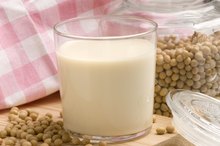Whey & Testosterone
Whey is a type of protein found in dairy and is sold in powdered form as a nutritional supplement. Whey powders are rich in protein and low in carbohydrates and fat, so they may be appropriate for use when dieting or attempting to gain muscle. Current research doesn't support whey as a testosterone booster, but several nutrients in the powder may aid in enhancing testosterone.
Whey and Testosterone
Whey's effect on testosterone levels may be determined by the timing of consumption. A study published in the November 2005 edition of "Medicine and Science in Sports and Exercise" found that consumption of whey protein prior to a workout inhibited exercise-related increases in testosterone. However, a study from the March 2010 edition of "Amino Acids" found that consuming whey before and after workouts did not alter testosterone levels. This suggests that taking whey after exercise may cancel out the decrease in testosterone that occurs when you take whey before exercise.
- Whey's effect on testosterone levels may be determined by the timing of consumption.
- However, a study from the March 2010 edition of "Amino Acids" found that consuming whey before and after workouts did not alter testosterone levels.
D-Aspartic Acid
Can Xyience Energy Drinks Help You Lose Weight?
Learn More
D-aspartic acid is an amino acid found in whey and other protein-rich products. This nutrient is one reason why whey may help increase your testosterone level. Research from the October 2009 issue of "Reproductive Biology and Endocrinology" found that taking d-aspartic acid supplements for as little as 12 days resulted in higher testosterone levels. Thus, a diet rich in whey protein may help to boost your testosterone levels.
- D-aspartic acid is an amino acid found in whey and other protein-rich products.
- Thus, a diet rich in whey protein may help to boost your testosterone levels.
Carnitine
Carnitine is another amino acid naturally found in whey and other protein-rich foods, such as beef. According to research published in the July 2006 edition of "Medicine and Science in Sports and Exercise," consuming carnitine along with your post-workout meal can result in increased testosterone. Because carnitine is in whey, a post-workout meal containing whey would help increase your testosterone more than a meal lacking whey.
Calcium
How to Lose Weight With Six Star Muscle Whey
Learn More
One of the nutrients included in whey is calcium, a mineral found in many dairy products. In addition to promoting strong bones, calcium may promote increased hormone levels. A study published in the December 2008 issue of "Biological Trace and Element Research" found that calcium could significantly increase testosterone levels.
Related Articles
References
- Medicine and Science in Sports and Exercise: Protein Ingestion Prior to Strength Exercise Affects Blood Hormones and Metabolism
- Reproductive Biology and Endocrinology: The Role and Molecular Mechanism of D-Aspartic Acid in the Release and Synthesis of LH and Testosterone in Humans and Rats
- Medicine and Science in Sports and Exercise: Androgenic Responses to Resistance Exercise: Effects of Feeding and L-Carnitine
- Boirie, Y., Dangin, M., Gachon, P., Vasson, M. P., Maubois, J. L., & Beaufrère, B. (1997). Slow and fast dietary proteins differently modulate postprandial protein accretion. Proceedings of the National Academy of Sciences, 94(26), 14930-14935.
- Anthony, J. C., Anthony, T. G., Kimball, S. R., & Jefferson, L. S. (2001). Signaling pathways involved in translational control of protein synthesis in skeletal muscle by leucine. The Journal of Nutrition, 131(3), 856S-860S.
- Cribb, P. J., Williams, A. D., Carey, M. F., & Hayes, A. (2006). The effect of whey isolate and resistance training on strength, body composition, and plasma glutamine. International Journal of Sport Nutrition and Exercise Metabolism, 16(5), 494-509.
- Baer, D. J., Stote, K. S., Paul, D. R., Harris, G. K., Rumpler, W. V., & Clevidence, B. A. (2011). Whey Protein but Not Soy Protein Supplementation Alters Body Weight and Composition in Free-Living Overweight and Obese Adults, 2. The Journal of Nutrition, 141(8), 1489-1494.
Writer Bio
Brian Willett began writing in 2005. He has been published in the "Buffalo News," the "Daytona Times" and "Natural Muscle Magazine." Willett also writes for Bloginity.com and Bodybuilding.com. He is an American Council on Exercise-certified personal trainer and earned a Bachelor of Arts in journalism from the University of North Carolina.









